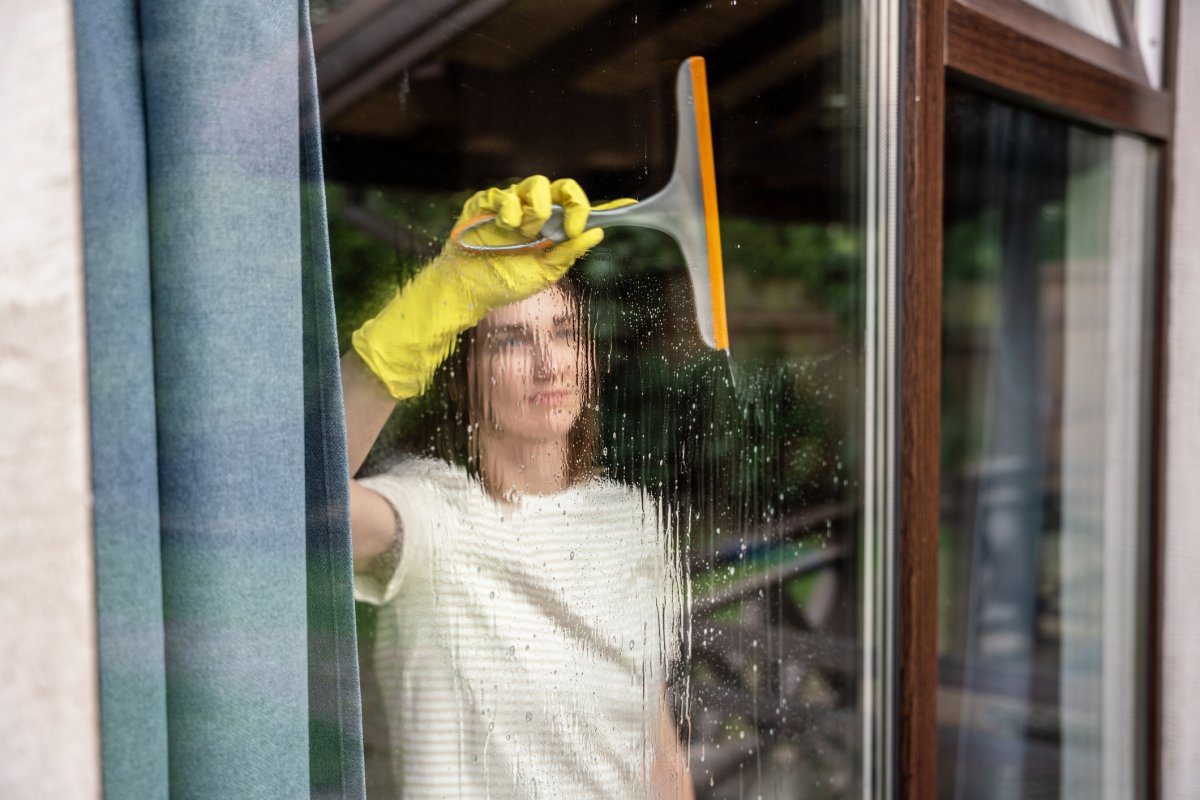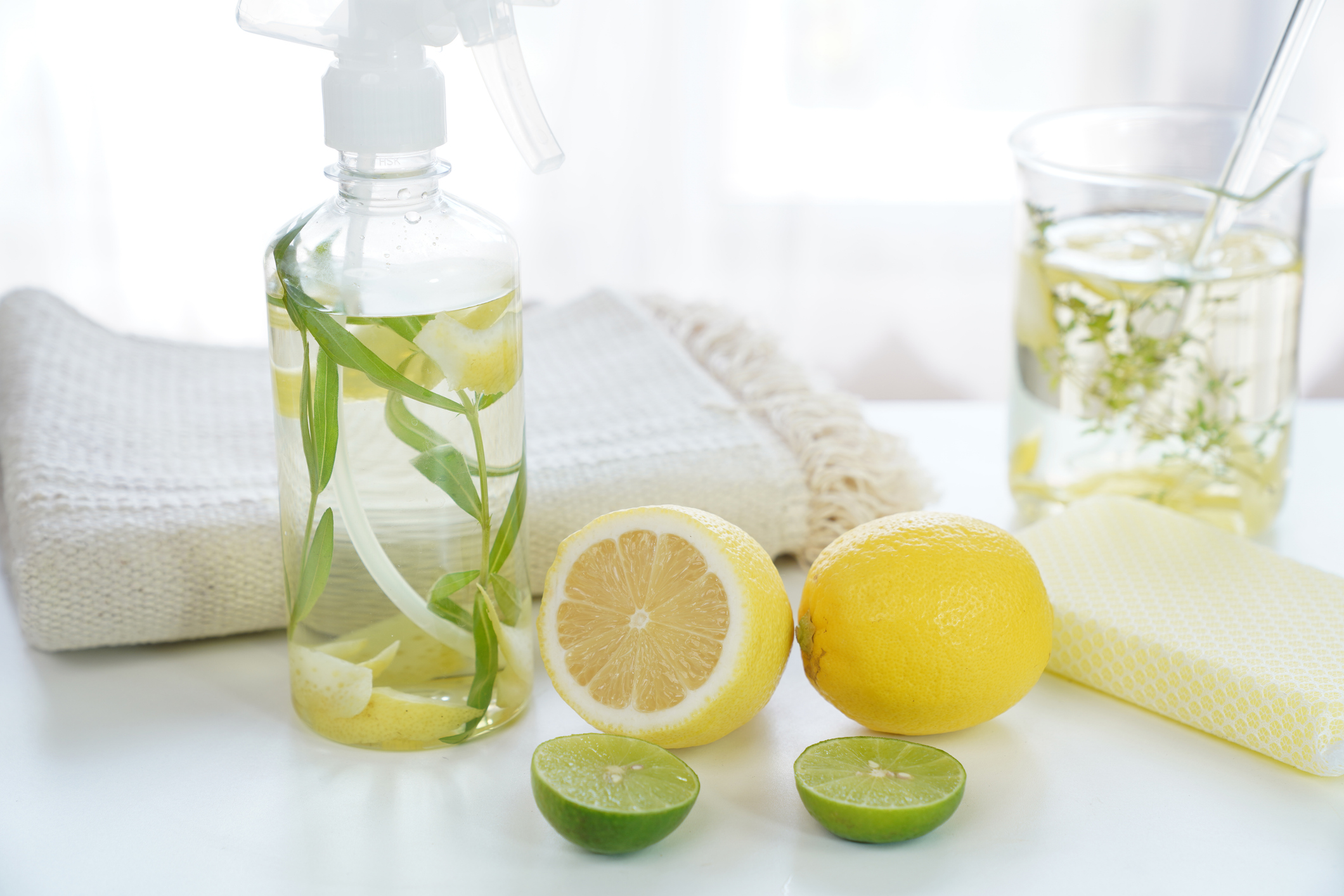We may earn revenue from the products available on this page and participate in affiliate programs. Learn More ›
Looking out into your picturesque backyard is something to be grateful for, but dirty and smudged windows can taint your view. For decades, people cleaned their windows with newspaper and vinegar since it was an easy and inexpensive option that didn’t leave behind residue or streaks and helped reuse old papers.
However, newspaper for windows is a cleaning hack that does not work anymore for several reasons. Fortunately, there are much better methods to clean windows, mirrors, and other glass surfaces. Here are the reasons why newspapers are no longer a good choice and some better tools for cleaning windows.
Newspaper isn’t as strong as it used to be.
In the past, newspapers were made with much thicker paper. The cheaper paper today doesn’t hold up as well as it used to, making the material less suitable for cleaning glass. “Today’s newspapers are thinner and less absorbent, meaning they can fall apart easily, leaving behind fibers and a mess,” says Leon Hansraj, CEO and founder of Gridlock Services, a commercial cleaning company based in Orlando, Florida.
Muffetta Krueger, cleaning expert and founder of Muffetta’s Housekeeping in Westchester County, New York, agrees. “Today’s newspapers are much thinner and more fragile, making them prone to tearing and leaving behind lint and residue.”
The ink used today makes it more difficult to clean glass.
The ink used to print newspaper content is also different from past ink types, and ink smudging is now a problem. “Unlike older newspapers with oil-based ink, modern newspapers use soy-based ink, which can smudge and leave streaks on glass,” says Krueger. Another issue is ink transfer. “The ink can transfer onto your hands and window frames, creating extra mess rather than a spotless finish,” she adds.

Most households don’t receive printed newspapers anymore.
The days of paperboys and papergirls are long gone. It’s now rare for households to get print newspapers delivered. In fact, it’s hard to find a printed newspaper even in supermarkets anymore. Instead, people receive their news online. Therefore, this material is no longer on hand to use for tasks like cleaning windows and mirrors. “With fewer people receiving physical newspapers, it’s a less practical choice,” says Hansraj.
Windows can get scratched.
As both the materials involved in producing newspapers and glass have changed over the years, the potential for scratching has increased. “Windows manufactured in the last approximately 7 years have a protective coating and/or tints that can be damaged by the abrasive texture of newspaper, essentially rubbing off the layer of coating,” says Aaron Reed, butler and estate manager at The Butler’s Choice in Portland, Oregon. “There’s also a risk of micro-scratches since some newspapers contain synthetic materials,” adds Hansraj.
Try these better window-cleaning alternatives instead:
Forget the newspaper hack. There are more effective ways to achieve a streak-free shine on windows, mirrors, and other glass surfaces.
Microfiber Cloths
Experts agree that soft microfiber cloths are an excellent option for removing dust and debris from glass surfaces. “They are highly effective at trapping dust and moisture, leaving glass spotless without streaks or lint. Plus, they’re reusable and eco-friendly” says Krueger. Look for well-made microfiber cloths that are tightly woven together. If you hold one up to the light and see no light poking through, then you know you have a high-quality product.

Squeegees
Another favorite tool, according to experts, is a squeegee, which has a thin piece of rubber, like a blade, on the end that is perfect for washing windows. It is abrasive enough to loosen dirt but will not damage the glass. With squeegees, you also can cover a larger area than with a balled-up newspaper or cloth, so you save some time. The handle on most squeegees helps you more easily clean hard-to-reach windows without standing on a ladder. Finally, squeegees are reusable, so you won’t need a new one every time you want to clean a glass surface in your home.
“We use professional-grade squeegees with gentle but effective cleaning solutions to remove grime without damaging the glass,” says Hansraj. They are effective because they ensure that you remove all the soap and water from the window, producing a streak-free shine. Krueger adds: “A high-quality squeegee with a bit of dish soap in warm water ensures a professional-grade clean without leaving streaks.”
Other Types of Cleaning Cloths
Krueger also recommends some other types of cleaning cloths. Look for glass-specific cleaning cloths that are specially designed to be lint-free, she says. “Also, reusable cleaning pads are another great eco-friendly choice, offering excellent cleaning power without waste,” says Krueger.
Coffee Filters
Another interesting option is to try wiping with a coffee filter. This inexpensive household staple is lint-free and won’t leave behind any residue. Just spray some cleaner and wipe with a coffee filter. Depending on how absorbent the filters are, you may need to use more than one at a time.

DIY Cleaners
You can make your own homemade glass cleaner to apply with one of these newspaper alternatives. Experts agree that the most effective and natural cleaning solution for your home is a mixture of water and vinegar. “For eco-conscious cleaning, a simple vinegar and water solution works wonders, breaking down dirt and leaving windows sparkling,” says Hansraj. Just mix equal parts white vinegar and water, spray it on the glass, and wipe with a microfiber cloth, says Krueger. Just keep in mind that a DIY cleaner is great for indoor windows, but might not be as effective on outdoor windows, which could require a professional strength cleaner to tackle the dirt, debris, and pollen that builds up outdoors from weather, air pollution, and other factors.


